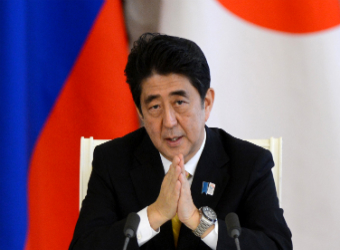Markets could start to question the long-term sustainability of Japanese Prime Minister Shinzo Abe’s economic program – known as ‘Abenomics’ – if his approval rating continues to decline, a market researcher has warned.
“In terms of all that good news we’re hearing from Japan, the most interesting story out of Japan at the moment is the collapse of approval rating of Prime Minister Abe,” Derek Halpenny, market researcher at the Mitsubishi UFJ Financial Group, told CNBC on Friday. “And the most recent approval rating data we got today, we saw the biggest collapse in the cabinet approval rating since Prime Minister Abe came into power in 2012.”
Japan’s third longest serving post-war prime minister was hit by poor approval ratings on Friday, shedding fresh doubt over the success of his administration’s economic reforms.
The approval rating for Abe’s government sunk to 29.9 percent, sliding below 30 percent for the first time. And his disapproval rating rising to 48.6 percent, according to a poll for the Jiji news agency.
A poll for the Asahi newspaper earlier this week revealed that only 33 percent of the Japanese public approved of the prime minister, while 47 percent disapproved.
These were the worst approval figures since Mr Abe’s re-election in 2012.
Halpenny said that there was a “real prospect” of markets beginning to doubt the prime minister’s economic program.
This confidence would be further damaged by the Bank of Japan’s governor Haruhiko Kuroda completing his term in April 2018, Abe’s Liberal Democratic Party holding a leadership election in September that year, and a general election by the end of the year, he added.
“When you have Abe’s approval rating collapsing like this, there is a risk that the markets could start to question the long-term sustainability of Abenomics,” he said.
The prime minister’s ‘Abenomics’ program is based upon “three arrows” of monetary easing, fiscal stimulus and structural reforms.
Some experts have commented that Abe’s approval rating may have declined due to scandals surrounding the prime minister, the most recent being a private school linked to Abe buying discounted public land. Critics have accused Abe of favoritism.
Abe’s government left its overall forecast for gross domestic product (GDP) growth unchanged in 2017. It expects GDP to grow by 1.5 percent in the current fiscal year and by 1.4 percent in the financial year 2018/2019.


